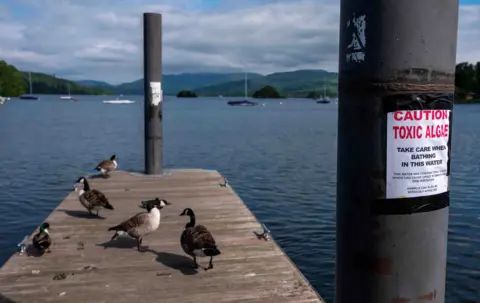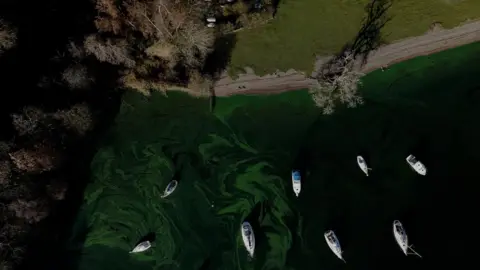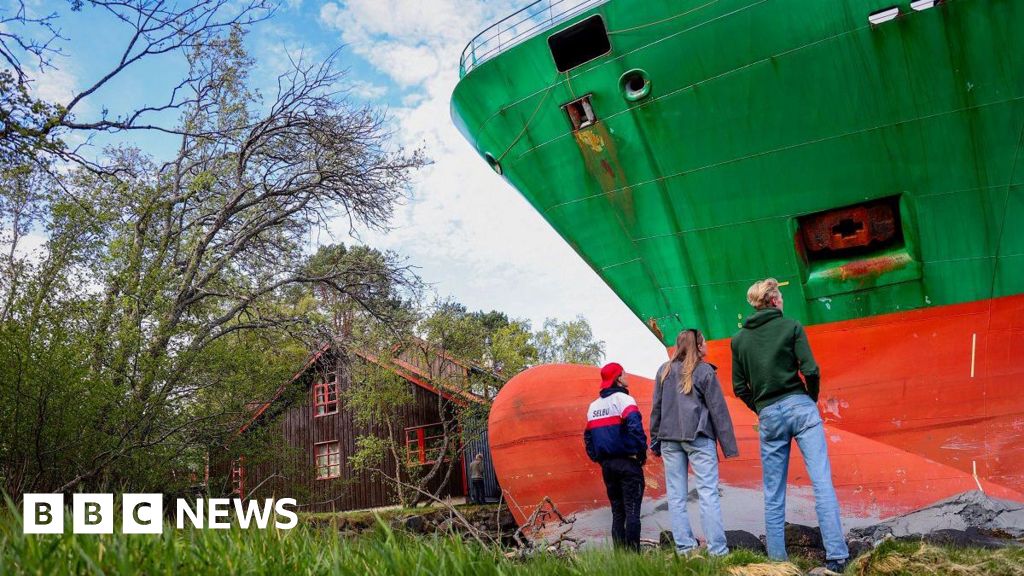Jonah Fisher
BBC environment correspondent
Reporting fromWindermere

 Reuters
Reuters
Sewage spilled illegally into Britain's largest lake on a record number of days last year, an analysis of water company data by campaigners suggests.
The analysis, which the BBC had exclusive access to, used United Utilities operational data to establish when the company was discharging sewage into Windermere when it should by law have been treating some of it.
The campaigners from Windrush Against Sewage Pollution (WASP) and Save Windermere identified 140 illegal spill days in 2024, more than in any of the three previous years.
United Utilities told BBC News that the campaigners' findings were "inaccurate" and some of the data "erroneous".
The company declined to put in writing, despite repeated requests, any specific examples of mistakes or omissions.
Regulators Ofwat and the Environment Agency are both currently investigating United Utilities operations.

 PA
PA
Windermere is one of Britain's most loved beauty spots
Last week the Environment Agency said United Utilities had spilled 77,817 times in 2024, the highest figure of all England's water companies.
Many of the spills will have been legal. All water companies are legally allowed to discharge raw sewage to stop the network getting overwhelmed and this now happens regularly during periods of heavy rain.
But almost all pumping stations and treatment plants operate under an environmental permit which specify that they must process or "pass forward" a certain amount of sewage and rainwater before spilling starts.
The campaigners cross-referenced United Utilities datasets showing when an asset was spilling against how much sewage it was treating at the time. The campaigners' analysis – which has been shared with and scrutinised by the BBC - found days when illegal spills appear to have occurred at each of six sewage facilities around the lake, which combined to 140 days in 2024. That's more than in any of the previous three years, as the chart below shows.
The longest illegal spill the analysis identified was for 10 days from Hawkshead pumping station, which flows into Windermere via Cunsey Beck.
"This is an indication that their works have not been maintained properly or they're not being watched over properly," says Prof Peter Hammond, a mathematican and retired academic from campaign group Windrush Against Sewage Pollution.
Prof Hammond's analysis of water company data has been cited by regulators and he has been praised in Parliament by water company executives for bringing problems to light they were previously unaware of.
The latest analysis covers four years of data from six sites that discharge sewage into the Lake Windermere catchment.
Comparisons over a longer time period are impossible as United Utilities has only had made full data sets available since 2021.


Prof Hammond's analysis of water company data has been praised in Parliament
The regulators Ofwat and the Environment Agency have since 2021 been investigating whether the water companies have been treating enough sewage before they start to spill. The EA call it a "major criminal investigation" while Ofwat call it "the largest and most complex Ofwat has ever undertaken".
Last week Yorkshire Water agreed to a £40m "enforcement action" after Ofwat uncovered "serious failures" in how it operated its treatment plant and network.
Ofwat declined to comment on the campaigner's findings as their investigation into United Utilities is ongoing.
In response to concerns about United Utilities the Environment Agency last year reviewed all of its environmental permits in the Windermere catchment and says this led directly to the water company tripling its investment plans for the area to £200m.
"We are currently carrying out investigations into suspected pollution incidents on the Windermere catchment and are unable to comment on these in detail until they have reached a conclusion," an EA spokesperson said when the campaigners' analysis was shared with them.
"Where we find breaches of environmental permits, we will take the appropriate enforcement action up to and including a criminal prosecution."

 Save Windermere
Save Windermere
Sewage has been blamed for turning parts of the lake green – so called "algal blooming"
United Utilities, which provides services to more than seven million people across north-west England, is more than £9bn in debt. Its chief executive Louise Beardmore confirmed to parliament in February that she was last year paid £1.4m including a bonus of £420,000.
"The methodology used by the campaigners is different to that used by the Environment Agency for its compliance assessments," the water company said in a statement.
"On top of that, erroneous data has been used, tags and naming conventions in data sets appear to have been misunderstood, and assumptions seem to have been made on whether different types of flow meters have been installed."
"The methodology fails to use other corroborating information from the sites which would prove that spills did not occur. As a result, the numbers quoted are inaccurate."
BBC News presented United Utilities with five examples of illegal spills the campaigners' analysis had identified using the company's data and asked for any evidence or explanation as to why they were not illegal. United Utilities repeatedly declined to do so in writing or on camera.
"What we're seeing is the failure of privatisation. We're seeing a prioritisation of dividend returns over the long-term environmental protection of places like Windermere" says Matt Staniek from Save Windermere.
"The bill payer has paid for a service that has never fully been provided, and the illegality demonstrates that for all to see."
Over the next five years bills in the United Utilities area will go up by 32% above the rate of inflation. On average that will mean a rise of £86 for the year that starts in April.
Louise Beardmore said the rises will fund the "largest investment in water and wastewater infrastructure in over 100 years".
For Windermere that's set to mean nine wastewater treatment works, including two that were included in the campaigners' analysis being upgraded and a reduction in the number of overflows discharging into the lake.

 1 month ago
63
1 month ago
63

















































